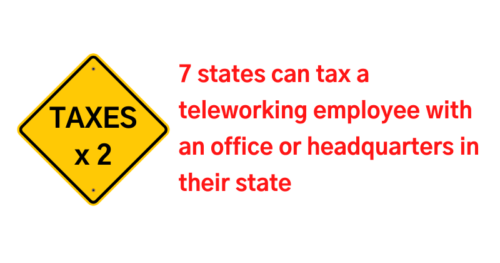How Teleworking Can Cause Double Taxation

“’Tis impossible to be sure of any thing but Death and Taxes”
-Christopher Bullock’s “The Cobbler of Preston” (1716)
We all know the drill. States can tax your income if you live there. States can tax your income if you just work there. It’s a well-known fact that some mega-earning professional athletes pay substantial non-resident taxes to both cities and states they’ve neither lived in nor spent much more than a few days a year working in during gamedays. For a lot of the “bridge and tunnel” crowd, the same income can end up on two separate state tax returns. For example, folks that commute from New Jersey into New York City must report and pay tax on income they earn from work performed in New York and then turn around and report the exact same income on their New Jersey tax returns (luckily they avoid double-taxation because the state of New Jersey allows a tax credit for the New York portion). But in recent years, a massive surge in tele-commuting has introduced us to a whole new aggravation. Namely, the idea that a citizen would incur income tax liability to a jurisdiction where they’ve never worked, never domiciled, nor even ever visited. You read that right.
Despite what you might think, the genesis of such a tax oddity pre-dates COVID. The declining tax bases of many metropolitan areas, due to the substantial growth of telework over the past decade, forced many taxing authorities to re-examine how to maintain revenues. But while the pandemic may not have created the situation, its effect, the creation of a WFH (Work From Home) nation, has accelerated the problem for states facing huge deficits. Naturally, lawsuits are brewing everywhere.
 At least seven states can now impose tax on an employee whose office or headquarters is located in their state, regardless of whether or not that employee has ever stepped foot there.
At least seven states can now impose tax on an employee whose office or headquarters is located in their state, regardless of whether or not that employee has ever stepped foot there.
My employer, Fahrenheit Advisors, is headquartered in beautiful Richmond, Virginia. But the notion that our Phoenix-based employees would have to pay Virginia state income tax is silly. At present, there is bi-partisan support in Congress for a Federal remedy to this problem. Some lawyers even argue that a state’s attempt to impose tax on someone not physically present is a huge over-reach and a violation of the commerce clause of the Constitution. Despite this, just last March, Massachusetts doubled down on the absurdity with its invention of a brand new pandemic-contingent sourcing rule. Simply put, a taxpayer who formerly worked in Massachusetts but, as a result of COVID, is now WFH in another state (like New Hampshire or Rhode Island) will still need to pay Massachusetts income tax for that homebound work. Yes, it’s an outrage and with any luck it will hopefully get struck down by a court somewhere employing basic human logic and reason. But for now, the risk of double-taxation on your income is a very real possibility to many Americas that haven’t been working in the office in the past year.
Fahrenheit Advisors works with many clients to address issues like these, and other important business decisions and their implications. Reach out to us at experts@fahrenheitadvisors.com.
 About the author
About the author
As a CPA, controller, and long-time consultant with over 20 years of experience, Russ Gambrel helps clients navigate the complexities of compliance and financial reporting, improve accounting processes, and gain a better understanding of the opportunities and challenges within their business. His experience in accounting, auditing, banking, information technology systems, and project management has positioned him as a senior level consultant and interim CFO and controller.